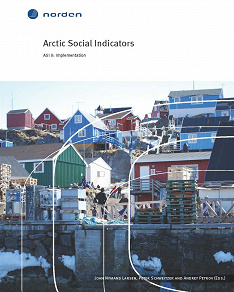
Förlag: Nordiska ministerrådet
Kategori:
Samhälle & politik
Tillgänglig sedan: februari 2015
Arctic Social Indicators
Arctic Social Indicators II (ASI-II) is a follow-up activity to ASI-I (2010) and the first Arctic Human Development Report (AHDR, 2004). The objective of ASI (2010) was to develop a small set of Arctic specific social indicators that as a collective would help facilitate the tracking and monitoring of change in human development in the Arctic. ASI indicators were developed for six domains that are considered prominent aspects of human development in the Arctic by residents in the Arctic: Health and Population; Material Wellbeing; Education; Cultural Wellbeing; Contact with Nature; and Fate Control.
The objective of the present volume of ASI is to present and discuss the findings of the work on measuring the set of recommended ASI indicators; to conduct a series of regional case studies to illustrate and test the strength and applicability of these indicators; to identify and describe data challenges for the Arctic region specifically in relation to these Arctic specific indicators and to draw conclusions about the ability of ASI to track changes in human development; and to formulate policy relevant conclusions for the long-term monitoring of Arctic human development.
The core content of ASI-II is a set of five carefully selected case studies, which form the basis for drawing conclusions about the applicability of the ASI indicators and for formulating policy relevant conclusions. Case studies are performed for Sakha Republic (Yakutia); the West-Nordic Region; Northwest Territories; Inuit Regions of Alaska; and the Inuit World, with the Survey of Living Conditions in the Arctic (SLiCA) used to augment ASI.
Findings on the state and changes in Arctic human development and wellbeing are presented. Based on our analysis and conclusions from the five case studies the framework for an ASI monitoring system is introduced. We argue that the long-term monitoring of human development in the Arctic would be greatly facilitated by the regular and frequent collection and reporting of relevant data, including those required for the proposed small set of ASI indicators.
Information
Stöds av följande plattformar
PC/Mac
Surfplatta Läsplatta
Smartphone
